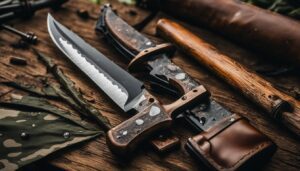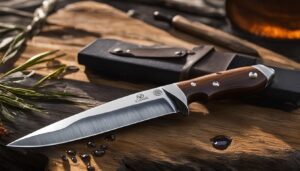As a hunting enthusiast, I understand the importance of keeping my knives in top-notch condition. One of the biggest threats to the longevity and performance of hunting knives is rust. Rust not only dulls the blades but also compromises their structural integrity. To ensure your hunting knives stay rust-free and ready for action, I’ve compiled the top rust prevention approaches and techniques.
Key Takeaways:
- Regularly oil your hunting knives using suitable knife oils to prevent rust formation.
- Properly cleaning and drying your knives after each use is crucial in preventing moisture buildup and subsequent rusting.
- Preserve wooden knife handles with mineral oil to prevent rotting and splintering.
- Store your knives in a cool and dry place with minimal temperature fluctuations and low humidity levels.
- Regularly maintain your knives by cleaning, oiling, and addressing any signs of rust promptly.
The Importance of Keeping Your Knives Clean and Dry
Proper knife maintenance, including keeping knives clean and dry, is essential for preventing rust formation and preserving their longevity. Moisture and fingerprints on the blades can lead to rust, so it is crucial to wipe the knives dry with a soft cloth or chamois after each use. This simple step helps remove any moisture that may be present on the blades, reducing the risk of rust. Additionally, knives, especially those made of high carbon steel, should be kept dry to avoid tarnishing and corrosion.
Applying a few drops of oil or wax to the blade with a cloth after drying provides an extra layer of protection against rust. The oil or wax creates a barrier between the metal surface and moisture in the air, preventing rust formation. Regularly oiling the knives, especially if they haven’t been used for an extended period, is recommended to keep them in optimal condition.
“Properly cleaning and drying your knives after each use is crucial for preventing rust and ensuring their longevity.” – Knife Maintenance Expert
Folding knives require special care when it comes to cleanliness and maintenance. It is important to keep the locking device clean and well-lubricated to ensure smooth operation and prevent rust. Avoid storing knives in leather sheaths, as leather can absorb moisture and contribute to rust formation. Instead, consider using a knife stand or block, or storing them individually wrapped in a soft cloth or paper to prevent scratches and maintain a dry environment.
By incorporating proper cleaning and drying techniques into your knife maintenance routine, you can significantly reduce the risk of rust and ensure that your knives remain in excellent condition for years to come.
Comparison of Knife Maintenance Methods
| Method | Advantages | Disadvantages |
|---|---|---|
| Regular cleaning and drying |
|
|
| Oiling the blades |
|
|
| Keeping folding knife mechanisms clean and lubricated |
|
|
Proper Storage Techniques for Rust Prevention
When it comes to preventing rust on hunting knives, proper storage techniques play a crucial role. Storing your knives in a cool and dry place is essential to minimize the risk of rust formation. High humidity levels can accelerate the oxidation process, leading to rust on your blades. By following these storage guidelines, you can ensure that your knives remain in optimal condition for years to come.
To create an effective storage environment, aim for a temperature between 68 and 72 degrees Fahrenheit. This temperature range helps prevent moisture buildup and keeps humidity levels low. Avoid storing your knives in leather sheaths, as leather can absorb moisture and potentially lead to rust. Instead, consider using a knife block, a knife magnet, or a knife roll for safe storage.
Additionally, it’s advisable to wrap your knives lightly before storing them. This protective measure helps prevent scratches and keeps your knives in pristine condition. Whether you choose to use a cloth wrap, a blade guard, or even a simple paper towel, the goal is to provide a barrier that shields your knives from potential damage.
Recommended Storage Techniques:
- Store knives in a cool and dry place with a temperature between 68 and 72 degrees Fahrenheit
- Avoid storing knives in leather sheaths
- Wrap knives lightly to prevent scratches
- Consider using a knife block, magnet, or roll for storage
| Storage Method | Advantages | Disadvantages |
|---|---|---|
| Kitchen Knife Block | – Easy access to knives – Protects blades from potential damage |
– Takes up counter space |
| Knife Magnet | – Space-saving storage solution – Keeps knives visible and easily accessible |
– Requires a metal surface for installation |
| Knife Roll | – Portable and convenient storage option – Protects knives during transportation |
– Limited capacity for larger knife collections |
By implementing these proper storage techniques and considering the advantages and disadvantages of different storage methods, you can effectively prevent rust formation on your hunting knives. Remember, investing a little time in proper storage now can save you the frustration of dealing with rust and ensure that your knives remain in excellent condition.

Regular Maintenance Check-Ups for Rust Prevention
Proper maintenance is essential for keeping hunting knives in prime condition and preventing rust formation. By incorporating regular maintenance check-ups into your routine, you can ensure that your knives remain in excellent shape and perform at their best. Here are some key steps to follow for effective rust prevention:
Cleaning
After each use, it is crucial to clean your hunting knives thoroughly. Use mild soap and warm water to remove any dirt, debris, or residue that may be present on the blades. Gently scrub the entire knife, paying attention to the handle, blade, and any other parts that may require cleaning. Rinse the knife thoroughly with clean water to remove any soap residue, and dry it completely with a soft cloth or towel.
Oiling
Applying a thin layer of oil to your hunting knives helps protect them from rust. Choose a high-quality knife oil that is specifically designed for rust prevention. Apply a few drops of oil directly onto the blade, and use a soft cloth to spread it evenly across the entire surface. Pay special attention to the areas that are most prone to rust, such as the blade edge and pivot points. Wipe off any excess oil to prevent buildup. Regularly oiling your knives will help maintain their performance and extend their lifespan.
Lubricating
In addition to oiling the blades, it is important to lubricate the pivot and locking mechanisms of folding knives. Use a small amount of lubricant, such as graphite or silicone-based oil, to keep these moving parts functioning smoothly. Apply the lubricant to the appropriate areas as recommended by the knife manufacturer. Regularly lubricating the pivot and locking mechanisms will ensure that your folding knives operate properly and reduce the risk of rust formation.
By following these regular maintenance check-ups, including cleaning, oiling, and lubricating, you can effectively prevent rust on your hunting knives and keep them in optimal condition for years to come.
Conclusion
To keep your hunting knives in prime condition and ensure rust-free blades, it is crucial to adopt effective rust prevention methods and prioritize knife maintenance. Oiling your knives with high-quality knife oils like Yoshihiro, Kurobara, Citadel Black’s, Thirteen Chefs, UltraSource, Tuf Glide, and Knife Pivot Lube is one of the most effective ways to prevent rust formation.
However, rust prevention goes beyond just oiling. Properly cleaning and drying your knives after each use is essential to remove any moisture or debris that can lead to rust. Storing your knives in a cool and dry place, away from leather sheaths that can absorb moisture, is also crucial for rust prevention.
Regular maintenance check-ups should be a part of your routine. Deep cleaning the blades, oiling them for added protection, and lubricating the pivot and locking mechanisms in folding knives will help keep your knives in optimal condition. By incorporating these rust prevention strategies and practicing regular knife maintenance, you can ensure your hunting knives remain rust-free and perform at their best, providing you with a seamless hunting experience.
FAQ
What is the best method for preventing rust on hunting knives?
Regularly oiling the knives is one of the best methods for preventing rust. There are various knife oils available in the market, such as Yoshihiro camellia oil, Kurobara knife oil, Citadel Black’s knife maintenance oil, Thirteen Chefs knife oil, UltraSource white mineral oil, Tuf Glide knife oil, and Knife Pivot Lube.
How do I apply oil to my hunting knife?
Apply just a few drops of oil to the blade and wipe off any excess for effective rust prevention.
How can I preserve wooden knife handles?
It is important to regularly oil the knife handles with mineral oil to prevent rotting and splintering.
How often should I oil my hunting knives?
It is recommended to oil the knives after every second use for optimal rust prevention.
Can I use food-grade knife oil on my kitchen knives?
Yes, food-grade knife oil is safe to use on kitchen knives and does not pose any health risks.
How do I prevent rust on folding knives?
Keep the locking device clean and well-lubricated, and avoid storing them in leather sheaths.
How should I store my hunting knives?
Store knives in a cool and dry place, preferably at a temperature of 68-72 degrees Fahrenheit. Avoid storing them in sheaths, especially leather ones, as they can collect moisture.
How often should I clean and oil my hunting knives?
Clean the knives after each use and deep clean them regularly. Oil and lubricate the blades and pivot mechanisms for optimal rust prevention.
What should I do if I see signs of rust on my hunting knife?
Address the rust promptly by cleaning and oiling the affected areas to prevent further damage.
How can I ensure the longevity of my hunting knives?
By following proper knife maintenance routines, including cleaning, oiling, and regular maintenance check-ups, you can significantly reduce the risk of rust and ensure your knives remain in excellent shape.





